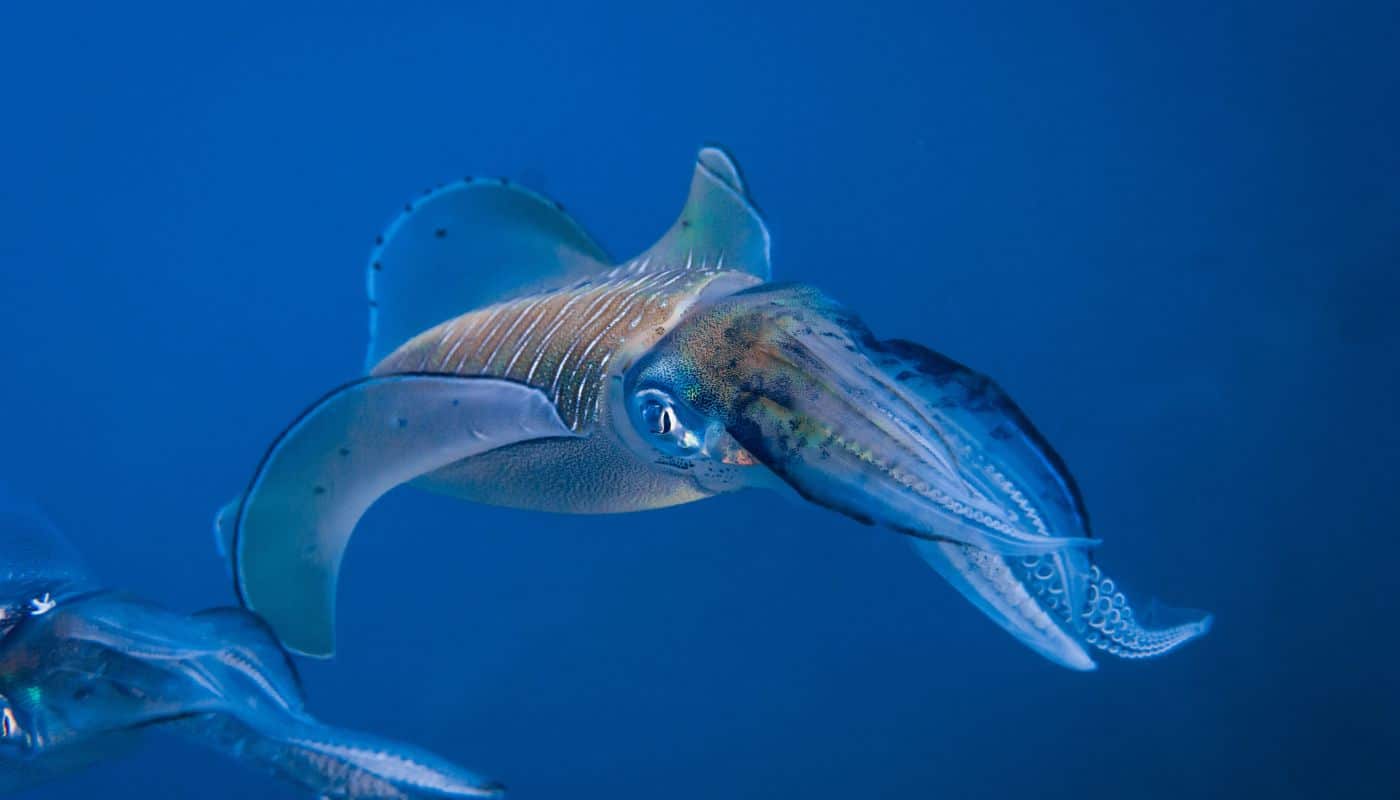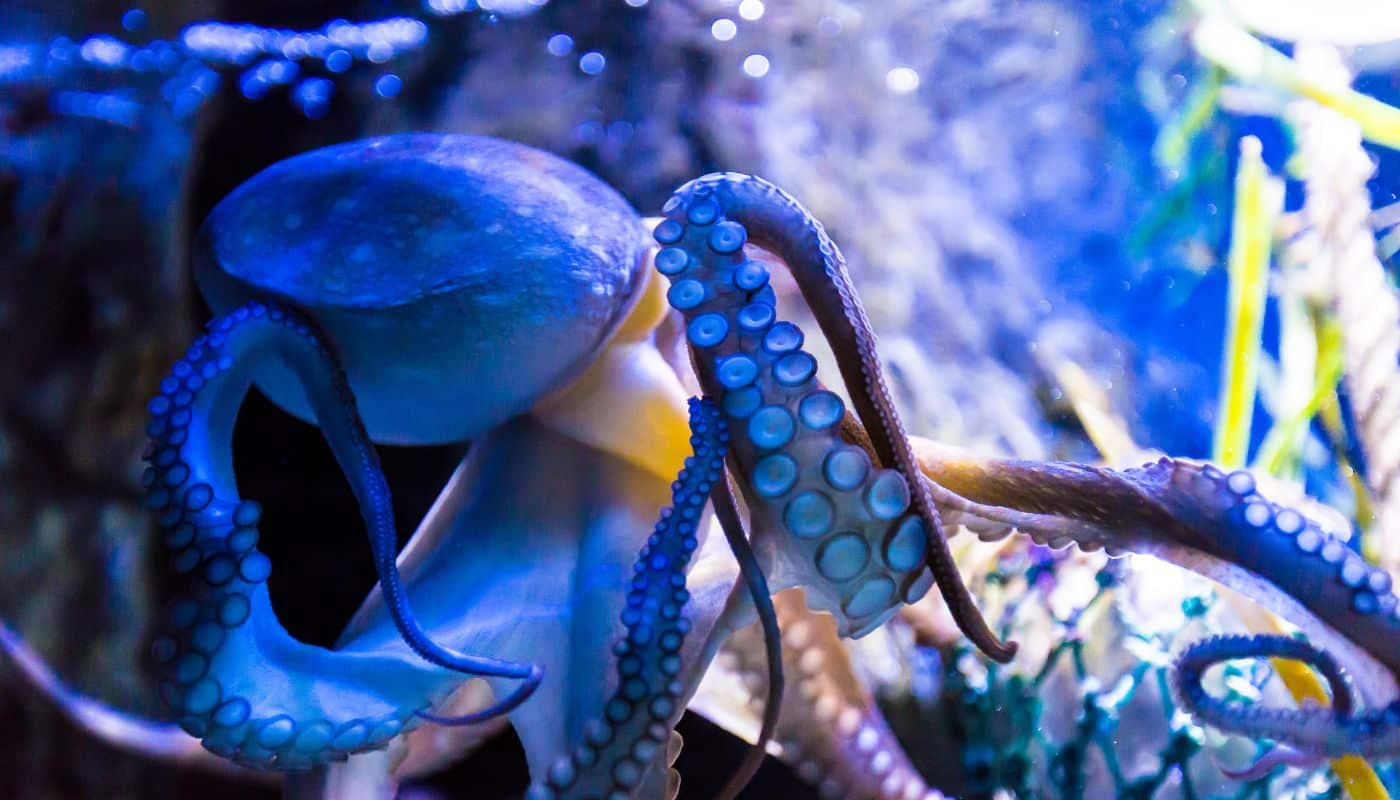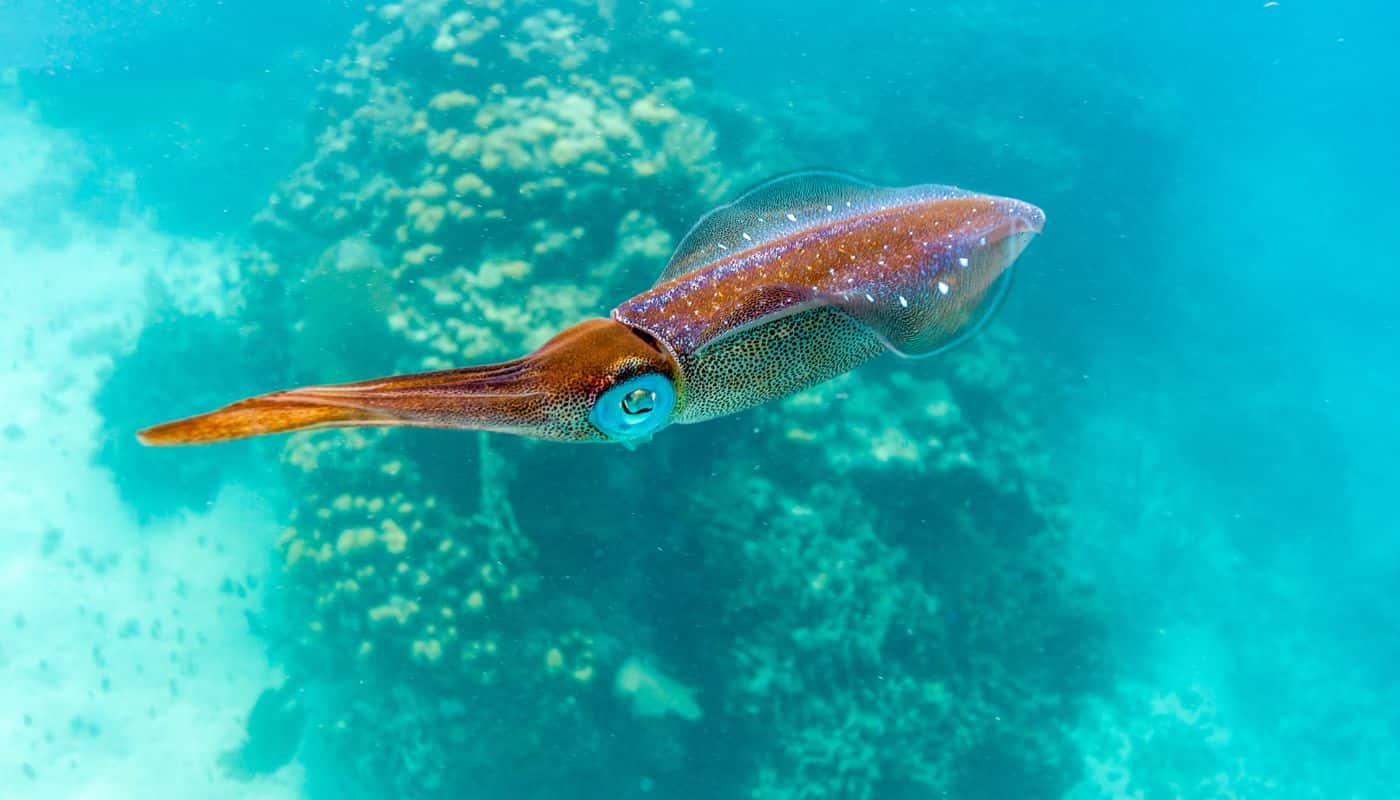Octopus vs. Squid – The Secret of these Mysterious Creatures
Dive into the depths of the ocean as we uncover the enigmatic world of the octopus and squid. In this intriguing article, we’ll explore the intriguing differences between these two fascinating sea creatures and shed light on the mysteries that surround them. From their unique physical characteristics to their intelligence and behavior, we’ll unravel the secrets that make them incredible and intriguing.
Octopuses and squids belong to the same class of cephalopods, with each species featuring distinctive traits that set them apart. Their ability to change their body color and shape, their adaptive camouflage, and even their incredible problem-solving skills will leave you in awe. Join us on an immersive journey as we delve into their lives, uncovering their fascinating hunting techniques and the remarkable communication skills they employ.

Indo-Pacific reef squid
Whether you are a marine enthusiast, a diver, or simply curious about the wonders of the ocean, this article will captivate your imagination and feed your thirst for knowledge. So, get ready to embark on a thrilling voyage into the depths and unlock the mysteries of these mesmerizing sea creatures.
Anatomy and Physical Characteristics of Octopuses
Octopuses are known for their mesmerizing appearance and fascinating physical characteristics. With their soft body and lack of internal or external support structures, they are incredibly flexible and can squeeze through the tiniest of openings. Their eight arms, lined with suction cups, are not only used for capturing prey but also for exploring their environment and manipulating objects. The mesmerizing ability to change color and texture allows them to blend seamlessly with their surroundings, providing them with an effective defense mechanism against predators.
The anatomy of an octopus includes a beak-like mouth at the center of its arms, surrounded by a ring of brain tissue. This unique design enables them to extend their arms in any direction, allowing for efficient hunting and navigation. Additionally, octopuses possess three hearts that pump blue-colored blood, providing oxygen to their entire body. These intriguing physical characteristics contribute to their ability to survive and thrive in the vast depths of the ocean.
Octopuses have a remarkable ability to regenerate lost limbs, a feature that sets them apart from many other creatures. This regenerative capability allows them to heal wounds and regrow limbs, ensuring their survival in the challenging underwater environment. Furthermore, their boneless bodies enable them to squeeze into tight spaces, making them excellent escape artists and challenging prey for predators.
Behavior and Intelligence of Octopuses
Beyond their unique physical characteristics, octopuses exhibit extraordinary behavior and intelligence. These intelligent creatures are known for their problem-solving abilities and complex learning behaviors. Researchers have observed octopuses using tools, such as coconut shells, to build shelters or protect themselves from predators. Their ability to learn through observation and trial-and-error showcases their high cognitive capabilities.
Octopuses are highly adaptable and display a wide range of hunting techniques. Some species employ ambush tactics, patiently waiting for their prey to come within striking distance before swiftly capturing it with their powerful arms. Others use their impressive speed and agility to chase down their prey. The ability to adapt their hunting strategies to different environments and prey types highlights their incredible intelligence and versatility.

Octopus tentacles closeup
Communication is another intriguing aspect of octopus behavior as compared to a squid. While they lack vocalizations, these intelligent creatures communicate using a variety of visual displays and body language. They can change the color and pattern of their skin, creating mesmerizing displays to convey messages or intimidate rivals. Octopuses also use arm movements and postures to communicate with each other and express their intentions.
Anatomy and Physical Characteristics of Squids
The squid, like their octopus counterparts, possess a unique set of physical characteristics that make them fascinating creatures of the sea. With their elongated bodies and torpedo-like shape, squids are built for speed and agility. They have a pair of large, complex eyes, providing them with excellent vision in the depths of the ocean. Additionally, they have a powerful beak that can deliver a strong bite to capture prey.
One of the most distinctive features of squids is their jet propulsion system, allowing them to move swiftly through the water. By expelling water through a muscular funnel, squids can achieve impressive speeds and maneuverability. This adaptation enables them to evade predators and catch their prey with precision.
Squids also possess a unique internal structure known as the pen, which provides support and stability to their bodies. This transparent, feather-shaped structure runs along the length of their body, acting as a rigid backbone. The pen, combined with their muscular mantle and fin-like structures, allows squids to maintain control and stability during their swift movements.
Behavior and Intelligence of Squids
Similar to octopuses, squids exhibit remarkable behavior and intelligence. They are highly skilled hunters, employing various tactics to catch their prey. Some species of squids use bioluminescent displays to attract prey, while others rely on stealth and speed to surprise their victims. Squids also have the ability to change their skin color and patterns, enabling them to blend in with their surroundings and avoid detection.
Squids are social creatures, often found in schools or groups known as shoals. Their social interactions involve complex visual displays, such as changing colors and patterns, to communicate with other squids. These displays can convey aggression, courtship, or warnings to potential rivals.

Caribbean coral reef squid
Researchers have also discovered evidence of squid intelligence through experiments. Squids have been observed learning and adapting their behavior based on previous experiences. They can navigate mazes, recognize patterns, and even display memory recall. These cognitive abilities contribute to their survival in the competitive world of the ocean.
Differences between the Octopus and Squid
While octopuses and squids belong to the same class of cephalopods, they have distinct differences that set them apart. One of the most noticeable differences is the number of arms. Octopuses have eight arms, while squids have ten. Octopuses also lack the elongated body shape and muscular mantle found in squids. Additionally, octopuses have the ability to regenerate lost limbs, while squids do not possess this regenerative capability.
Another significant difference lies in their hunting strategies. Octopuses are known for their intelligence and problem-solving skills, often employing ambush tactics or using tools to capture prey. On the other hand, squids rely on their speed and agility, using their jet propulsion system to chase down and capture their prey.

Similarities between Octopuses and Squids
Despite their differences, octopuses and squids also share several similarities. Both species possess highly developed eyes, providing them with excellent vision in the underwater environment. They also have the ability to change the color and pattern of their skin, allowing them to camouflage with their surroundings and communicate with other members of their species.
Octopuses and squids both exhibit remarkable problem-solving abilities and complex learning behaviors. They can learn through observation and adapt their hunting strategies based on their environment and prey. Their intelligence and adaptability have contributed to their success as predators in the ocean.
Ecological Roles and Habitats of the Octopus and Squid
Octopuses and squids play vital ecological roles in the ocean ecosystem. They are both considered keystone species, meaning they have a significant impact on the balance and diversity of their habitats. Octopuses and squids are important predators, controlling the population of their prey species and preventing overpopulation.
Octopuses are primarily found in rocky or coral reef habitats, where they can seek shelter and camouflage among the crevices and corals. They are also known to inhabit the sandy ocean floor, where they use their adaptive camouflage to blend in with the surroundings. Squids, on the other hand, are more commonly found in open ocean environments, where they have ample space to swim and maneuver.

Fun Facts about Octopuses and Squids
1. The largest known species of octopus is the Giant Pacific Octopus, which can have a span of up to 30 feet and weigh more than 600 pounds.
2. Squids have the ability to change the color and pattern of their skin in a matter of seconds, allowing them to effectively hide from predators or attract mates.
3. Octopuses have the ability to squirt ink as a defense mechanism. The ink acts as a smokescreen, allowing them to escape from predators.
4. Some species of squids have the ability to propel themselves out of the water, using a technique known as “jetting,” to evade predators or catch prey.
5. The Humboldt Squid, also known as the “red devil,” is known for its aggressive nature and has been observed hunting in large groups.
The Intriguing World of the Octopus and Squid
The world of octopuses and squids is filled with mystery, intelligence, and incredible adaptations. These fascinating creatures continue to captivate our imagination with their unique physical characteristics, remarkable behavior, and impressive problem-solving skills. As we delve deeper into the depths of the ocean, we uncover the secrets that make them some of the most intriguing inhabitants of the sea. Whether you are a marine enthusiast, a diver, or simply curious about the wonders of the ocean, the world of octopuses and squids will undoubtedly leave you in awe of their beauty and complexity. So, embark on this thrilling voyage, and prepare to unlock the mysteries of these mesmerizing sea creatures.
Tubbataha Reef, Philippines: A Scuba Diver’s Paradise
Tubbataha Reef, Philippines: A Scuba Diver’s Paradise




